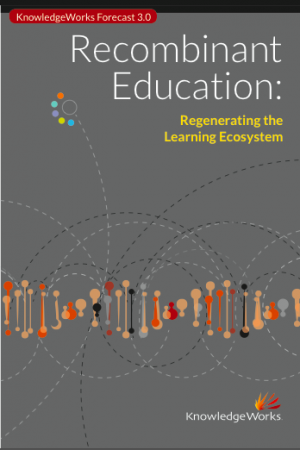 What will the future of education look like? KnowledgeWorks Foundation has just released the third edition of its education forecast, called Forecast 3.0, Recombinant Education: Regenerating the Learning Ecosystem, that outlines the deconstruction of the current education model, a change in educators' roles based on their strengths, changing career pathways, and the role of technology in this realm. The language might seem a bit futuristic, but the insights are fascinating. Below, two short excerpts.
What will the future of education look like? KnowledgeWorks Foundation has just released the third edition of its education forecast, called Forecast 3.0, Recombinant Education: Regenerating the Learning Ecosystem, that outlines the deconstruction of the current education model, a change in educators' roles based on their strengths, changing career pathways, and the role of technology in this realm. The language might seem a bit futuristic, but the insights are fascinating. Below, two short excerpts.
CUSTOMIZABLE VALUE WEBS
While the digital explosion has long been creating an expanding ecosystem of new services, applications, and tools, innovative business models will find new ways of harnessing these opportunities into flexible value webs that deliver highly customer-centric experiences.
Across industries, new intermediaries, novel customer value propositions, and creative ways of facilitating open digital platforms and networks are already transforming customer experiences. For example, new intermediaries in the music industry have integrated platforms such as iTunes, Google+, and Facebook with artist information, concert databases, and mobile apps to transform passive listeners into active music participants who share, create, remix, and produce music.
In education, new intermediaries will facilitate a similar integration of networks and systems that bring learners, resources, services, data, and learning agents together in novel value webs. Schools will no longer be singular, enclosed organizations.
Instead, they will serve students by harnessing and brokering resources and talent across the global community. Customer-centric value propositions will guide the creation of learning experiences that leverage rich value webs to serve distinct populations. What began as a “bring-your-own-device” (BYOD) movement may very well turn into a “create-your-own-school” movement as new intermediaries, learning agents, parents, and learners collaborate to weave vibrant value webs.

